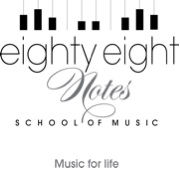FAQ
Do you hold recitals for children? Where are they held? Do recitals cost extra?
We hold recitals twice a year at Eighty Eight Notes School of Music. Students have the chance to share their new found skills and material with family and friends. Performing for a live audience enhances the student's excitement and joy of playing. Performers include a wide range of students from beginner to advanced. Recitals are not mandatory, but encouraged. There is a $25 annual recital fee regardless of participation.
My child is just a beginner. Will they be able to play some songs after a few months of lessons?
In a few months time you will make noticeable progress on your instrument. However, it is completely up to the student's ability, how much time he/she can devote to practicing, and what his/her specific goals are. Generally speaking, a couple of months of lessons will only scratch the surface of an individual's goal to learn a musical instrument. Music is the pursuit of a lifetime. We do try to get a song into each student's fingers by the first few lessons.
What can I do as a parent to assist my child in her piano lessons
Many successful musicians regard their parents' influence and inspiration as the most important in sparking their own interest in serious music. Whether or not your child makes a career of music, your efforts in bringing the world of music to your child will make his or her life fuller and happier. You can help your child learn faster and enjoy lessons more by doing a few simple things:
We hold recitals twice a year at Eighty Eight Notes School of Music. Students have the chance to share their new found skills and material with family and friends. Performing for a live audience enhances the student's excitement and joy of playing. Performers include a wide range of students from beginner to advanced. Recitals are not mandatory, but encouraged. There is a $25 annual recital fee regardless of participation.
My child is just a beginner. Will they be able to play some songs after a few months of lessons?
In a few months time you will make noticeable progress on your instrument. However, it is completely up to the student's ability, how much time he/she can devote to practicing, and what his/her specific goals are. Generally speaking, a couple of months of lessons will only scratch the surface of an individual's goal to learn a musical instrument. Music is the pursuit of a lifetime. We do try to get a song into each student's fingers by the first few lessons.
What can I do as a parent to assist my child in her piano lessons
Many successful musicians regard their parents' influence and inspiration as the most important in sparking their own interest in serious music. Whether or not your child makes a career of music, your efforts in bringing the world of music to your child will make his or her life fuller and happier. You can help your child learn faster and enjoy lessons more by doing a few simple things:
- Become Involved With Your Child's Piano Training.
- You can attend my lesson once a month to observe how I teach, especially new concepts. You are able to coach your child by reviewing those new concepts.
- If you have any questions, feel feed to ask me
- Encourage Your Child As Much As Possible.
- Be sure to praise effort as well as accomplishment. Even if your child does not learn as fast as another, in the long run, hard work will determine the final result. There is no better way to bring about the hard work than to reward the effort. Try to express interest in what your child is doing, even if you are getting tired of hearing "Chopsticks". Encourage your child in every way possible to perform for family and friends in relaxed settings.
- Avoid Negative Criticism.
- Most of us respond better to thoughtful, loving help than undirected criticism. If your child seems uncooperative, it may mean that they need more help, encouragement, and support. Punishment is usually not a long-term solution.
- Make Sure Your Child Knows That You Consider Music a Serious Commitment.
- Schedule piano practice time for your child just as regularly as you do Little League or soccer practice. See to it that practice sessions are as free as possible from distractions.
- If the piano is in the living room, try to limit access to the living room during your child's allotted practice time. If your child has not practiced for some reason, do not cancel lessons. If you find the child's interest in lessons waning, the best thing to do it to discuss the problem with your child's teacher; often, this can be solved with proper stimulation and supervision by you and the teacher working together.
- Provide As Much Cultural Enrichment As Possible.
- The experience of listening to music without the pressure of having to play the notes correctly can add greatly to your child's appreciation for music generally and lessons in particular.
- Have CDs that your children are able to listen to, go to concerts with your children whenever possible. I do perform throughout the year and I do encourage my students to see their teacher perform as it may inspire them.
